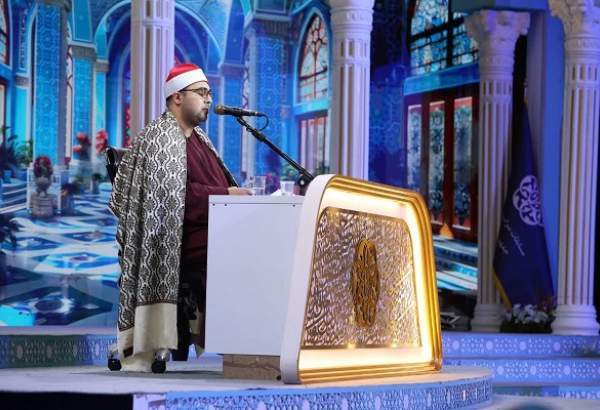Listen to the article
In a recent interview with Taqrib News Agency (TNA), renowned Egyptian Quran reciter Mustafa Ahmed Abdrabou praised the extraordinary devotion to Islamic scripture he witnessed during his visit to Iran’s Kurdistan province, where he participated in the 48th national Quran competitions.
Abdrabou expressed particular admiration for the enthusiastic reception given to Quranic gatherings in Iran, noting that despite having attended similar events in more than a dozen countries, he had “not seen such glorious welcoming” anywhere else.
The Egyptian reciter acknowledged that his perception of Iran had been significantly transformed by his firsthand experience in the country. Prior to his visit, his understanding had been shaped primarily by media representations that he now recognizes as inaccurate.
“What I saw was religious vitality, social peace, and various Quranic programs,” Abdrabou stated, highlighting the contrast between his actual observations and the narratives often circulated by certain international media outlets.
He specifically condemned what he described as “hostile media” engaged in promoting “Iranophobia” – deliberate efforts to cultivate negative perceptions of Iran through misrepresentation. According to Abdrabou, these portrayals fail to capture the reality of Iranian society, which he characterized as “pious, modest and fascinated by holy Quran.”
The reciter’s comments come at a time when Iran’s image in international media continues to be a contentious issue. While Western news sources frequently focus on geopolitical tensions, nuclear concerns, and human rights issues, religious and cultural aspects of Iranian society often receive less attention.
Iran has long positioned itself as a center for Islamic scholarship, particularly for Shia Muslims, with cities like Qom and Mashhad serving as important religious learning centers. The national Quran competitions represent one facet of the country’s broader emphasis on Islamic traditions and education.
The Kurdistan province, where Abdrabou attended the competition, is home to a predominantly Sunni Kurdish population, making the enthusiastic reception of Quranic events there particularly noteworthy as an example of religious unity transcending sectarian divisions that are often highlighted in regional coverage.
Cultural and religious exchanges such as Abdrabou’s visit play an increasingly significant role in people-to-people diplomacy between nations with strained official relations. Egypt and Iran have had complicated diplomatic ties since the 1979 Islamic Revolution, with periods of tension and limited formal relations.
Religious scholars and cultural figures often serve as unofficial ambassadors, providing alternative channels for engagement outside formal political structures. These interactions can sometimes offer more nuanced perspectives on societies that are frequently subject to reductive characterizations in mainstream international discourse.
Abdrabou’s observations align with growing concerns among media analysts about the gap between representations of countries in news coverage and their lived realities. This phenomenon affects numerous nations but is particularly pronounced regarding countries with contentious relationships with Western powers.
For Iranian officials, testimonials from respected international visitors like Abdrabou provide valuable counters to what they view as systematic distortion of their country’s image abroad. Such personal accounts from cultural and religious figures carry particular weight in regions where faith remains a central component of social identity.
The 48th national Quran competition continues a long tradition of scriptural recitation contests that hold significant cultural importance throughout the Muslim world, where mastery of Quranic recitation is highly respected and competitions draw substantial public interest.
Verify This Yourself
Use these professional tools to fact-check and investigate claims independently
Reverse Image Search
Check if this image has been used elsewhere or in different contexts
Ask Our AI About This Claim
Get instant answers with web-powered AI analysis
Related Fact-Checks
See what other fact-checkers have said about similar claims
Want More Verification Tools?
Access our full suite of professional disinformation monitoring and investigation tools




14 Comments
I like the balance sheet here—less leverage than peers.
Silver leverage is strong here; beta cuts both ways though.
Silver leverage is strong here; beta cuts both ways though.
Good point. Watching costs and grades closely.
If AISC keeps dropping, this becomes investable for me.
Good point. Watching costs and grades closely.
Good point. Watching costs and grades closely.
Nice to see insider buying—usually a good signal in this space.
Good point. Watching costs and grades closely.
Good point. Watching costs and grades closely.
Uranium names keep pushing higher—supply still tight into 2026.
Silver leverage is strong here; beta cuts both ways though.
The cost guidance is better than expected. If they deliver, the stock could rerate.
Nice to see insider buying—usually a good signal in this space.